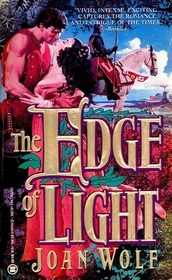Anny P. (wolfnme) reviewed The Edge of Light (Dark Ages of Britain, Bk 3) on + 3389 more book reviews
Reviewer: Kimberly Gelderman (Spring Lake, MI USA) -
I've read a few historical novels on the life of this enigmatic King, Alfred the Great. None have compared in the sheer depth of character study the author exhibits here of this great leader. We get to know Alfred through all the phases of his life, from childhood to manhood and eventually king. His life is showcased in a way that lets the reader experience his every emotion, adventure, battle, health crises through his eyes and through his brother's and eventually his wife's, Elswyth.
He was a nobly born man, however, he was the fifth son and was never expected to be king, nor did he want to be. The twists and turns of his family's lives changes all of that. From his father's death, King Ethelwulf of Wessex, to all of his brother's deaths, including his favorite brother Ethelred, who bequeaths the throne over his eldest son to Alfred, his destiny, is forever changed. He is a leader who refuses to give up his dream of a free Wessex and rallies his countrymen to him to continue the fight against the Vikings. He does this with the help of his wife Elswyth, Princess of Mercia, who is a force of her own to be reckoned with.
Together, they will endeavor to save their kingdom, their lives and their people's lives, from the pagan invasion the Danes constantly threaten them with. This is the king who worked so diligently to bring learning to his devasted land. Joan Wolf states in her Afterword: "The educational system of Anglo-Saxon England had been founded on the great monasteries, and these had been devasted by the Danes, leaving Wessex in a state of absolute poverty in regard to learning."
The only complaint I have regarding this book is the lack of a "regional map" at the time of Alfred the Great. I had to refer to another map from another book. I prefer to refer to a map, as I'm sure many other readers like to do, when locations are so important to the storyline in relation to battles, etc., that I really can't do without one. I believe it's integral to the story. More authors need to realize that readers really do need these maps to follow the storyline.
I've read a few historical novels on the life of this enigmatic King, Alfred the Great. None have compared in the sheer depth of character study the author exhibits here of this great leader. We get to know Alfred through all the phases of his life, from childhood to manhood and eventually king. His life is showcased in a way that lets the reader experience his every emotion, adventure, battle, health crises through his eyes and through his brother's and eventually his wife's, Elswyth.
He was a nobly born man, however, he was the fifth son and was never expected to be king, nor did he want to be. The twists and turns of his family's lives changes all of that. From his father's death, King Ethelwulf of Wessex, to all of his brother's deaths, including his favorite brother Ethelred, who bequeaths the throne over his eldest son to Alfred, his destiny, is forever changed. He is a leader who refuses to give up his dream of a free Wessex and rallies his countrymen to him to continue the fight against the Vikings. He does this with the help of his wife Elswyth, Princess of Mercia, who is a force of her own to be reckoned with.
Together, they will endeavor to save their kingdom, their lives and their people's lives, from the pagan invasion the Danes constantly threaten them with. This is the king who worked so diligently to bring learning to his devasted land. Joan Wolf states in her Afterword: "The educational system of Anglo-Saxon England had been founded on the great monasteries, and these had been devasted by the Danes, leaving Wessex in a state of absolute poverty in regard to learning."
The only complaint I have regarding this book is the lack of a "regional map" at the time of Alfred the Great. I had to refer to another map from another book. I prefer to refer to a map, as I'm sure many other readers like to do, when locations are so important to the storyline in relation to battles, etc., that I really can't do without one. I believe it's integral to the story. More authors need to realize that readers really do need these maps to follow the storyline.
I love this book. It is one of my favorites of all time. It tells the story of Alfred, the only king in England to ever be called The Great. It traces his life from boyhood, through the defeat of the Viking invaders. A wonderful story of a time in history we know little about. Some people believe that Alfred holds the real place in history that storytellers have given to Arthur.




